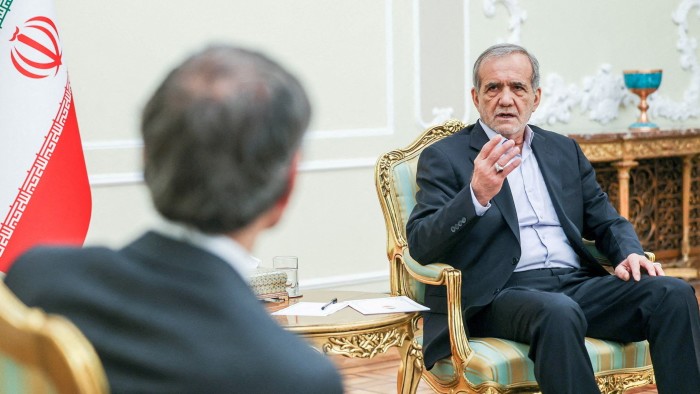Iran ramping up highly enriched uranium stockpile, UN warns

Unlock the Editor’s Digest for free
Roula Khalaf, Editor of the FT, selects her favourite stories in this weekly newsletter.
Iran has taken steps to “dramatically” increase its stockpile of uranium enriched close to weapons grade, the head of the UN nuclear watchdog said, in a move that will escalate tensions with the US and Israel.
Rafael Grossi, director-general of the International Atomic Energy Agency, said the move by Tehran, which is in retaliation to a decision by European powers to censure the Islamic republic, was “very concerning”.
He said it could increase Iran’s capacity to produce uranium enriched to 60 per cent purity, which is close to weapons-grade levels, by “seven or eight times”.
“They are going to have a huge amount of material very soon,” Grossi said. “It’s very concerning why you have all this material. To a certain extent, they themselves recognise that, they say when you pass a resolution ‘I will multiply the enrichment’”.
He added that “if they make them really turn [activate them] all of them, it will be a huge jump”.
The Iranian move will heighten tensions with the US as Donald Trump prepares to return to the White House, as well as European powers and Israel, which has vowed to prevent Tehran acquiring nuclear weapons.
Trump, who triggered a nuclear stand-off with Iran by unilaterally abandoning a 2015 accord Tehran signed with world powers to limit its nuclear activity, and imposed waves of sanctions on the republic, has nominated Iran-hawks to senior posts in his incoming administration.
Iran has been aggressively expanding its nuclear programme since 2019, the year after Trump pulled the US out of the accord, while insisting it is for peaceful civilian use. In recent months, Iranian officials have warned Tehran could change its nuclear doctrine if it faces an existential threat.
Those warnings have come as Iran’s years-long shadow war with Israel has been thrust into the open with the arch enemies exchanging direct missile fire for the first time after Hamas’s October 7, 2023 attack ignited a wave of regional hostilities.
Tehran warned that it would activate additional advanced centrifuges after the IAEA’s members last month adopted a resolution, drafted by the UK, France and Germany, and backed by the US, that censured Iran over its nuclear activities.
It called for the UN watchdog to compile a “comprehensive report” into Iran’s nuclear activities. The report could be used by western powers to make their case internationally next year if they trigger a so-called snapback process, leading to the reimposition of UN sanctions on Iran.
The resolution said Iran had failed to co-operate with a long-running IAEA probe into past nuclear activity at three undeclared sites.
Days before the IAEA met last month, Iran, which faces mounting domestic and external pressures, had signalled it could be willing to compromise. Iranian officials held talks with the watchdog about potentially capping its stockpile of highly enriched uranium, during a visit by Grossi to Tehran.
But western officials were sceptical, insisting they wanted to see Iranian action rather than words.
The IAEA said that Iran was now feeding advanced centrifuges at its Fordow plant that are used to produce 60 per cent uranium with 20 per cent purity uranium, rather than 5 per cent as it had done previously.
It said the effect of the change would be to “significantly increase” the rate of production of uranium enriched up to 60 per cent to over 34kg per month compared with 4.7kg.
The IAEA also said last week that Iran had informed the agency that it intended to start the commissioning and operation of 18 cascades of centrifuges installed at its Natanz plant.
Experts say that after enriching uranium at 60 per cent for more than three years, Iran already has sufficient fissile material to build several nuclear weapons if it chose to do so.
#Iran #ramping #highly #enriched #uranium #stockpile #warns




